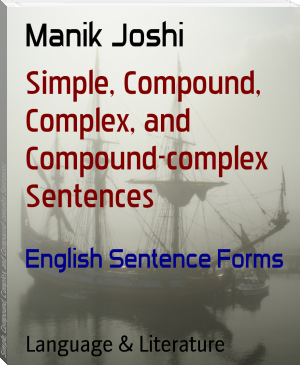Simple, Compound, Complex, and Compound-complex Sentences by Manik Joshi (i love reading .txt) 📕

- Author: Manik Joshi
Book online «Simple, Compound, Complex, and Compound-complex Sentences by Manik Joshi (i love reading .txt) 📕». Author Manik Joshi
A complex sentence contains an independent clause joined by one or more dependent or subordinate clauses. Dependent (subordinate) clause begins with a subordinating conjunction or a relative pronoun. In other words, a complex sentence always has a subordinating conjunction (subordinator) or a relative pronoun.
Clauses in a complex sentence are not structurally equal. They express related thoughts. Subordinators or relative pronouns are used not only to connect these clauses but also to show the ‘clear and specific relationship’ between the clauses. In other words, subordinator or relative pronoun show how one clause (dependent or subordinate clause) is dependent on other. The two parts are no longer of equal importance.
Following is the brief description of subordinating conjunctions and relative pronouns:
(A). Subordinating conjunctions [Also known as ‘Subordinators] –
Subordinators may be classified according to their meaning (logical relationship), as follows:-
(a). Subordinating Conjunctions [Cause or Reason]:
as
because
considering (that)
in order (that)
since
so (that)
that
why
(b). Subordinating Conjunctions [Comparison]:
as much as
rather than
than
whereas
whether
(c). Subordinating Conjunctions [Concession]:
although
as
as though
even though
except
just as
though
whereas
while
(d). Subordinating Conjunctions [Condition]:
assuming (that)
even if
if
in case (that)
lest
only if
provided (that)
unless
until
whether
whether or not
(e). Subordinating Conjunctions [Consequence or Result]:
that
(f). Subordinating Conjunctions [Manner]:
as
if
as though
how
(g). Subordinating Conjunctions [Place]:
whence
where
wherever
(h). Subordinating Conjunctions [Purpose]:
in order (that)
so
so that
that
(i). Subordinating Conjunctions [Time]:
after
as
as long as
as soon as
before
by the time
now that
once
since
still
till (or until)
when
whenever
while
Following words are also subordinating conjunctions:
wherein [Meaning: in which]
whereby [Meaning: by which]
wherewith [Meaning: with which]
wherefore [Meaning: for which]
Punctuation Rules: Subordinating conjunction
Subordinator could be used in the beginning or in the middle of the sentence. When you begin sentence with subordinator, you should use comma (,) before beginning second clause. If you put subordinator in the middle of the sentence, you don’t need to use comma before second clause. In Other Words - When ‘dependent clause’ comes first, you should separate the clauses with a comma. When ‘independent clause’ comes first, you don’t need to use a comma.
Pattern: subordinate clause + comma + independent clause
Complex Sentence: Examples [using subordinating conjunctions]
Example 1:
After he completed his post-graduation, he applied for the job. Or
He applied for the job after he completed his post-graduation.
Independent clause – He applied for the job.
Dependent clause – After he completed his post-graduation. [This sentence cannot stand on its own.]
Example 2:
When her mother arrived at home, she was singing. Or
She was singing when her mother arrived at home.
Independent clause – She was singing.
Dependent clause – When her mother arrived at home. [This sentence cannot stand on its own.]
Example 3:
If you help me in this hour of crisis, I will help you later. Or
I will help you later if you help me in this hour of crisis.
Independent clause – I will help you later.
Dependent clause – If you help me in this hour of crisis. [This sentence cannot stand on its own.]
(B). RELATIVE PRONOUNS:
A relative pronoun is used to connect a clause or phrase to a noun or pronoun. That, Which, Who, Whom, and Whose are relative pronouns that are commonly used in complex sentences. “Which” is more formal than ‘that’
Following is the complete list of relative pronouns:
that what whatever whatsoever which whichever who whoever whom whomever whomsoever whose whoso whosoever
Complex Sentence: Examples [using relative pronouns]
Example 1:
Complex Sentence – She has a house that looks like a palace.
Independent clause – She has a house.
Dependent clause – That looks like a palace. [This sentence cannot stand on its own.]
Example 2:
Complex Sentence – This is the book which I bought for him.
Independent clause – This is the book.
Dependent clause – Which I bought for him. [This sentence cannot stand on its own.]
Example 3:
Complex Sentences – School administration praised the boy who won the first prize.
Independent clause – School administration praised the boy.
Dependent clause – Who won the first prize. [This sentence cannot stand on its own.]
Example 4:
Complex Sentences – He entered the building whose windows were broken.
Independent clause – He entered the building.
Dependent clause – Whose windows were broken. [This sentence cannot stand on its own.]
IMPORTANT NOTE: Difference between Subordinating Conjunctions and Relative Pronouns:
Relative Pronouns act as the subject of a dependent clause.
Subordinating conjunctions are followed by the subject of their clause.
Compound-Complex SentenceA mixed sentence or compound-complex sentence is a type of complex sentence in which there is more than one independent clause joined by one or more dependent or subordinate clauses. Thus, a mixed sentence is the combination of compound sentence and subordinate clause. Sometimes, complex sentence is connected with simple sentence. Sometimes, there is more than one complex sentence.
Thus, three situations are possible:
Mixed Sentence Having A Subordinate Clause And A Compound Sentence.
Example:
Even though he won the competition, he didn’t organize the party, but his father bought him a laptop.
There is one subordinate clause and a compound sentence.
Subordinate Clause – Even though he won the competition.
Compound Sentence – He didn’t organize the party, but his father bought him a laptop.
[Two Independent Clauses – He didn’t organize the party. His father bought him a laptop.]
Mixed Sentence Having A Simple And A Complex Sentence.
Example:
I entered the class after teacher came, but my classmate didn’t join the class.
Here, first part is a complex sentence. Second part is a simple sentence.
Complex Sentence – I entered the class after teacher came.
[Independent Clause – I entered the class. Subordinate Clause – After teacher came.]
Simple Sentence (Independent Clause) – My classmate didn’t join the class [subject – classmate, predicate – didn’t join the class]
Mixed Sentence Having More Than One Complex Sentence.
Example:
I will go to market when I finish my work, and he will go to playground when he completes his duty.
Here both the clauses are complex sentences.
Complex Sentence 1:
I will go to market when I finish my work
[Independent Clause – I will go to market. Subordinate Clause – when I finish my work.]
Complex Sentence 2:
He will go to playground when he completes his duty.
[Independent Clause – He will go to playground. Subordinate Clause – when he completes his duty.]
Sentence Forms - Comparison
Based on the use of independent and dependent clause; simple, compound, complex, and compound-complex sentences could be compared as follows:
Simple sentence –
One independent clause
Compound sentence –
Two or more independent clauses
Complex sentence –
One independent clause and one or more dependent (subordinate) clauses
Compound-Complex sentence (Mixed Sentence) –
Two or more independent clauses and at least one dependent (subordinate) clause
*********************
About the AuthorManik Joshi was born on January 26, 1979 at Ranikhet, a picturesque town in the Kumaon region of the Indian state of Uttarakhand. He is permanent resident of the Sheeshmahal area of Kathgodam located in the city of Haldwani in the Kumaon region of Uttarakhand in India. He completed his schooling in four different schools. He is a science graduate in the ZBC – zoology, botany, and chemistry – subjects. He is also an MBA with a specialization in marketing. Additionally, he holds diplomas in “computer applications”, “multimedia and web-designing”, and “computer hardware and networking”. During his schooldays, he wanted to enter the field of medical science; however, after graduation he shifted his focus to the field of management. After obtaining his MBA, he enrolled in a computer education center; he became so fascinated with working on the computer that he decided to develop his career in this field. Over the following years, he worked at some computer-related full-time jobs. Following that, he became interested in Internet Marketing, particularly in domaining (business of buying and selling domain names), web design (creating websites), and various other online jobs. However, later he shifted his focus solely to self-publishing. Manik is a nature-lover. He has always been fascinated by overcast skies. He is passionate about traveling and enjoys solo-travel most of the time rather than traveling in groups. He is actually quite a loner who prefers to do his own thing. He likes to listen to music, particularly when he is working on the computer. Reading and writing are definitely his favorite pastimes, but he has no interest in sports. Manik has always dreamed of a prosperous life and prefers to live a life of luxury. He has a keen interest in politics because he believes it is politics that decides everything else. He feels a sense of gratification sharing his experiences and knowledge with the outside world. However, he is an introvert by nature and thus gives prominence to only a few people in his personal life. He is not a spiritual man, yet he actively seeks knowledge about the metaphysical world; he is particularly interested in learning about life beyond death. In addition to writing academic/informational text and fictional content, he also maintains a personal diary. He has always had a desire to stand out from the crowd. He does not believe in treading the beaten path and avoids copying someone else’s path to success. Two things he always refrains from are smoking and drinking; he is a teetotaler and very health-conscious. He usually wakes up before the sun rises. He starts his morning with meditation and exercise. Fitness is an integral and indispensable part of his life. He gets energized by solving complex problems. He loves himself the way he is and he loves the way he looks. He doesn’t believe in following fashion trends. He dresses according to what suits him and what he is comfortable in. He believes in taking calculated risks. His philosophy is to expect the best but prepare for the worst. According to him, you can’t succeed if you are unwilling to fail. For Manik, life is about learning from mistakes and figuring out how to move forward.
Website: http://www.manikjoshi.com | Email: manik85joshi@gmail.com
****************





Comments (0)